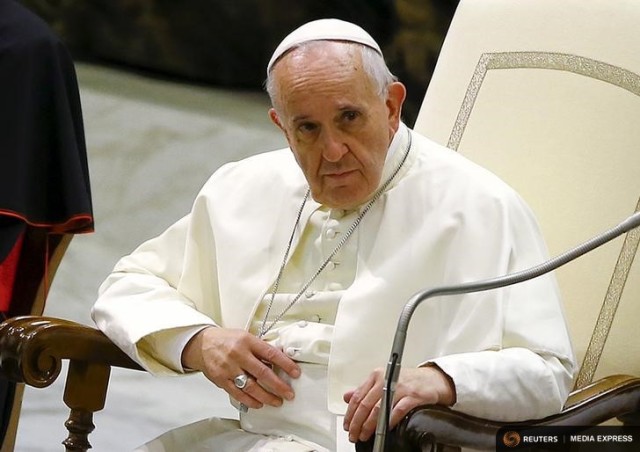
By Philip Pullella, VATICAN CITY (Reuters) Sept 8, 2015 – Pope Francis, making the most substantial changes to Catholic marriage annulment procedures in centuries, radically simplified them on Tuesday and said bishops should provide greater help to divorced couples.
In a move that again showed his desire for the Church to be more merciful to Catholics in difficulty, Francis reaffirmed traditional teaching on the “indissolubility of marriage”, but streamlined annulment procedures which many considered cumbersome, lengthy, outdated and expensive.
Last week Francis made it easier for women who have had abortions to receive absolution if they are truly contrite over their action and confess it to their local priest during the Church’s upcoming Holy Year of Mercy, which starts in December.
In the document, known as a Motu Proprio, Latin for “by his own initiative”, Francis eliminated a previously mandatory automatic review of an annulment decision by a second diocesan tribunal and gave bishops sweeping powers to quickly judge the most simple, clearcut cases themselves.
The title of the document was “Mitis Iudex Dominus Iesus,” Latin for “The Lord Jesus, the Gentile Judge.”
An annulment, formally known as a “decree of nullity”, is a ruling that a marriage was not valid in the first place according to Church law because certain prerequisites, such as free will, psychological maturity and openness to having children, were lacking.
Francis, who set up a commission of experts last year to advise him, said he decided the procedures needed to be speeded up so that Catholics who sought annulments should not be “long oppressed by darkness of doubt” over whether they could have their marriages declared null and void.
ANNULMENTS SHOULD BE FREE
Most annulments are granted at a local level and only the most complicated cases reach a special court at the Vatican, known as the Rota. Francis said the procedures, which can cost thousands of dollars in legal fees, should be free.
Monsignor Pio Vito Pinto, dean of the Vatican court that rules on annulments, told a news conference the new rules were the most substantive changes to annulment laws since the papacy of Benedict XIV, who reigned from 1740 to 1758.
The reform was keenly awaited by many couples around the world who have divorced and remarried outside the Church.
The 1.2 billion member Church does not recognize divorce and Catholics who remarry in civil ceremonies are considered to be still married to their first spouse and living in a state of sin. This bars them from receiving sacraments such as communion.
Many couples and priests have complained that the current procedures are obsolete and too complicated, and discourage even those with legitimate grounds for an annulment from trying.
The situation of divorced and remarried Catholics who want to fully participate in the Church is a topic of great debate, particularly in countries such as the United States and Germany. It will be a major topic at a synod of bishops from around the world at the Vatican next month.
This month Francis is making a landmark trip to the United States, where more than 23,000 annulment procedures, or nearly half of the world’s cases, were started, according to the Center for Applied Research in the Apostolate at Georgetown University.
Making it easier for divorced couples to receive annulments would allow them to return to the sacraments.
In an addendum to the document on procedures, the pope said bishops should show “particular pastoral concern” for divorced and remarried Catholics and give them more help on annulments.
(Reporting by Philip Pullella; Editing by Mark Heinrich)












